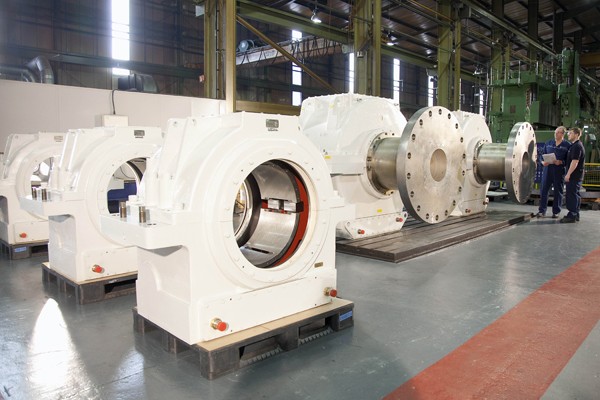Genoa Dockers Walk Out as Italian Unions Protest Against Israel
Striking dockworkers blocked access roads to the port of Genoa in northern Italy on Monday, as part of protests against Israel's offensive in Gaza.

Rolls-Royce, the global power systems company, has completed the latest components in the power and propulsion system it is supplying for the Royal Navy’s new aircraft carriers HMS Queen Elizabeth and HMS Prince of Wales.
The final batch of Michell thrust blocks and lineshaft bearings, which will support the rotating shafts that drive the ships’ propellers, were handed over in a ceremony at the Rolls-Royce facility in Newcastle.
The forward motion created by the rotating propellers is transferred through the two Michell thrust blocks, which are secured to the hull and each weigh more than 20 tonnes, to move the 65,000 DWT ships through the water. The twin propellers deliver around 80 megawatts of power – enough to run 1,000 family cars or 50 high speed trains.

The propeller shafts run approximately one third of the length of the 290 meter ships, and Rolls-Royce has also completed the Michell line shaft bearings, which support the weight of the propellers and rotating shafts along the hull of the ship. During operation, the bearings are designed to generate a film of oil, which is typically around the thickness of a human hair, between the bearing surfaces and shafts on which the bearing loads are supported.
Jim Bennett, Power & Propulsion Director for the Aircraft Carrier Alliance, said: “The Rolls-Royce facility in Newcastle has almost 100 years of association with the Royal Navy, and this latest contract marks a significant milestone for the Queen Elizabeth class project.
“With over 50,000 horsepower per shaft to transmit, these bearings are not without challenges in design and manufacture. The team who have built them should be very proud of the part they are playing in delivering such impressive and capable ships to the Royal Navy.”
Paul Seago, Managing Director, Rolls-Royce – Newcastle, added: “Completion of these bearings marks the latest milestone in the aircraft carrier programme, which has seen Rolls-Royce deliver an extensive range of highly advanced marine equipment over the past two years. We have now completed the supply of equipment for the first ship Queen Elizabeth, and are making good progress on the second, Prince of Wales.”
“These were the largest bearings we’ve manufactured for many years, and I would like to pay tribute to everyone involved for the part they played to ensure, like all other Rolls-Royce equipment on the project, they were delivered on time.”
In 2008, Rolls-Royce won a £96 million contract to supply a significant range of equipment to the Queen Elizabeth class aircraft carrier programme, providing power and propulsion systems to both vessels. Since then, great progress has been made in delivering highly complex components that will be at the heart of what will be Europe’s largest ever naval vessels.
Rolls-Royce is supplying the ships’ MT30 gas turbines, which at 36 megawatts each are the world’s most powerful for marine use. In addition to the bearings and thrust blocks handed over today, Rolls-Royce is manufacturing propellers, rudders, stabilising fins and the entire low voltage electrical system for both ships.
The aircraft carriers HMS Queen Elizabeth and HMS Prince of Wales are being delivered by the Aircraft Carrier Alliance, a unique partnering relationship between BAE Systems, Thales UK, Babcock and the UK Ministry of Defence.

Sign up for gCaptain’s newsletter and never miss an update

Subscribe to gCaptain Daily and stay informed with the latest global maritime and offshore news
Essential news coupled with the finest maritime content sourced from across the globe.
Sign Up